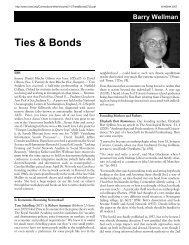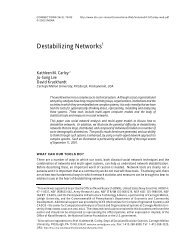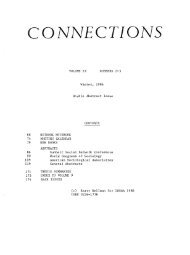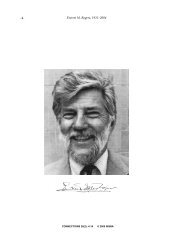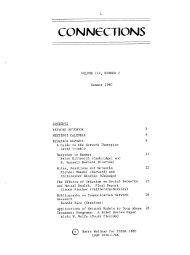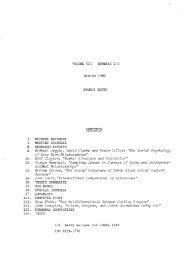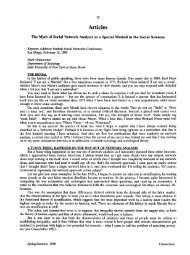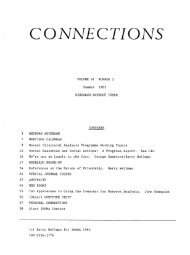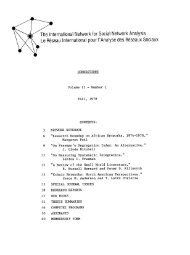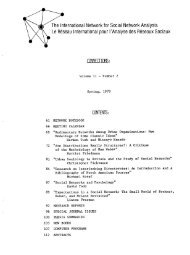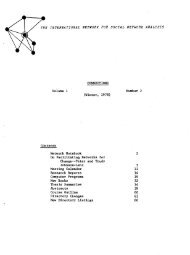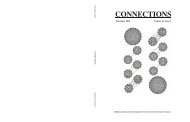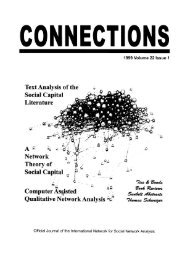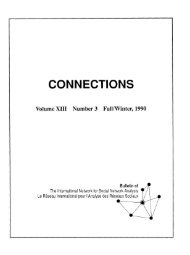- Page 1: Sunbelt XXXIInternational Network f
- Page 5 and 6: A Mixed‐method Approach To Subgro
- Page 7 and 8: A Novel Hybrid Egocentric‐archiva
- Page 9 and 10: A Social Network Analysis Of Tsiman
- Page 11 and 12: A Technique For Analyzing Ergm Beha
- Page 13 and 14: Actor Heterogeneity In Dynamic Infl
- Page 15 and 16: An Agent‐based Approach To Evalua
- Page 17 and 18: Anxious Solitude And Social Disinte
- Page 19 and 20: Are You Getting What You Came For?
- Page 21 and 22: Association Of Social Networks, Psy
- Page 23: Birds Of The Feather Flock Together
- Page 27 and 28: Centrality, Structural Holes And St
- Page 29 and 30: Coalitions In Exchange Networks: So
- Page 31 and 32: Collaborating Through Networks: The
- Page 33 and 34: Collaboration For Collective Action
- Page 35 and 36: Collaborators Or Friends: Longitudi
- Page 37 and 38: Comparing Local Configurations In S
- Page 39: Cooperation Dynamics In Networks Cu
- Page 42: Cross‐sectional Approximations To
- Page 45 and 46: Designing Policy Tools For Building
- Page 47 and 48: Discovering Jewish NetworksKadushin
- Page 49 and 50: Dyadic Reciprocity And The Emergenc
- Page 51 and 52: Dynamics Of Scientific Collaboratio
- Page 53 and 54: Efficient Structures For Innovative
- Page 55 and 56: Entrepreneurship And Local Embedded
- Page 57 and 58: Exploring Knowledge Transfer In Vir
- Page 59 and 60: Extracting Leadership And Influence
- Page 61 and 62: Failing To See Or Failing To Seize
- Page 63 and 64: Flows Of Cultural Consecration: Who
- Page 65 and 66: Fostering Support For Innovative Pr
- Page 67 and 68: From Whitehall To Leadenhall: Busin
- Page 69 and 70: Game Modeling In Public Organizatio
- Page 71 and 72: Generosity As A Public Good: Hetero
- Page 73 and 74: Harvard Catalyst Profiles: An Open
- Page 75 and 76:
Homophily And Propinquity In Social
- Page 77 and 78:
How Far Our Network Perceptions Are
- Page 79 and 80:
Impact Of Team Faultlines On Socio
- Page 81 and 82:
Individualization As Driving Force
- Page 83 and 84:
Influences Of Return Migration On I
- Page 85 and 86:
Innovation Through ImitationGladsto
- Page 87 and 88:
Interplay Between Individual And Gr
- Page 89 and 90:
Is It Just Me, Or Are You Stressed?
- Page 91 and 92:
Knowledge Sharing In Non‐knowledg
- Page 93 and 94:
Link‐trace Sampling For Social Ne
- Page 95 and 96:
Lotico The Semantic Social NetworkN
- Page 97 and 98:
Mapping Networks: Spatial Visualiza
- Page 99 and 100:
Markets Or Networks: Rural Househol
- Page 101 and 102:
Measurement Error In Network Analys
- Page 103 and 104:
Micro‐mobilization In A Scientifi
- Page 105 and 106:
Mixing In Large Populations: Some N
- Page 107 and 108:
Modeling Real World Interpersonal N
- Page 109 and 110:
Multilevel Longitudinal Analysis Fo
- Page 111 and 112:
Multiplexity, Heterogeneity And Ove
- Page 113 and 114:
Network Centralization And The Diss
- Page 115 and 116:
Network Influence On Adolescent Alc
- Page 117 and 118:
Network Structure And A Proposed
- Page 119 and 120:
Networked Play For Health: Promotin
- Page 121 and 122:
Networks, Collective Action, And St
- Page 123 and 124:
Online And Offline Ego‐centered N
- Page 125 and 126:
Organizational Embeddedness And Str
- Page 127 and 128:
Peer Effects In Migrants’ Remitta
- Page 129 and 130:
Personal Influence Among Core Ties
- Page 131 and 132:
Perspectives To Soldiers' Professio
- Page 133 and 134:
Predicting Survival From Social Net
- Page 135 and 136:
R&D Networks, Knowledge Transfer An
- Page 137 and 138:
Reasoning About Large‐scale Socia
- Page 139 and 140:
Relational Compensation In Entrepre
- Page 141 and 142:
Representation Of Complex Cognitive
- Page 143 and 144:
Road Networks And Insurgent Violenc
- Page 145 and 146:
School/community Policing‐‐mixe
- Page 147 and 148:
Sex And Drug HIV‐risk Networks Am
- Page 149 and 150:
Small EU Member States' Export Patt
- Page 151 and 152:
Social Constraints, Agency, And Ins
- Page 153 and 154:
Social Network Analysis In Multiple
- Page 155 and 156:
Social Network Resilience Given Inf
- Page 157 and 158:
Social Networks And Sustainability
- Page 159 and 160:
Social Snacking: Friends’ Influen
- Page 161 and 162:
Static Visualization Of Network Dyn
- Page 163 and 164:
Structure And Consistency: Assessme
- Page 165 and 166:
Teaching Undergraduates Social Netw
- Page 167 and 168:
The Development Of Japanese Interlo
- Page 169 and 170:
The Effects Of Social Networks, Pro
- Page 171 and 172:
The Formation Of Social Capital And
- Page 173 and 174:
The Impact Of Different Non‐respo
- Page 175 and 176:
The Influential Power Of eWOM Distr
- Page 177 and 178:
The Paradox Of Connection: Social N
- Page 179 and 180:
The Return Of Quality Of Social Cap
- Page 181 and 182:
The Small World Phenomena Of Patent
- Page 183 and 184:
The Structure Of Consensus: Cohesio
- Page 185 and 186:
Time Heterogeneity In Stochastic Ac
- Page 187 and 188:
Two‐mode Projection And Data Loss
- Page 189 and 190:
Understanding The Different Facets
- Page 191 and 192:
Using A Web‐based Survey To Elici
- Page 193 and 194:
Using Social Network Analysis To Ma
- Page 195 and 196:
Using Weak‐ties For Problem Solvi
- Page 197 and 198:
Viable And Non‐viable Models Of C
- Page 199 and 200:
Voting Power CentralityCarnegie, Je
- Page 201 and 202:
Who Shares? Exploration Of Manageri
- Page 203 and 204:
Worlds Apart ‐ Network Emergence
- Page 205 and 206:
Aupetit, Michael ‐ CEA LIST ‐ m
- Page 207 and 208:
Borgatti, Steve ‐ U of Kentucky,
- Page 209 and 210:
Chiang, Yen‐sheng ‐ University
- Page 211 and 212:
De salabert, Arturo ‐ Universidad
- Page 213 and 214:
Everett, Martin ‐ University of M
- Page 215 and 216:
Garayev, Vener ‐ University of Ce
- Page 217 and 218:
Hahn, Christian stadil ‐ Enso Con
- Page 219 and 220:
Houtman, Leonie ‐ VU University,
- Page 221 and 222:
Kaminski, Jermain ‐ Massachusetts
- Page 223 and 224:
La pointe, Allison ‐ Minnesota De
- Page 225 and 226:
Luque, John ‐ Georgia Southern Un
- Page 227 and 228:
Mo, Guang ying ‐ University of To
- Page 229 and 230:
Oh, Yoon ‐ USC ‐ yoonkyuo@usc.e
- Page 231 and 232:
Portales, Luis ‐ Tecnológico de
- Page 233 and 234:
Samila, Sampsa ‐ Brock University
- Page 235 and 236:
Shoham, David ‐ Loyola University
- Page 237 and 238:
Strully, Kate ‐ University at Alb
- Page 239 and 240:
Valente, Annie ‐ UC‐San Francis
- Page 241 and 242:
Welch, Eric ‐ University of Illin
- Page 243:
Zhu, Jonathan ‐ City University o



